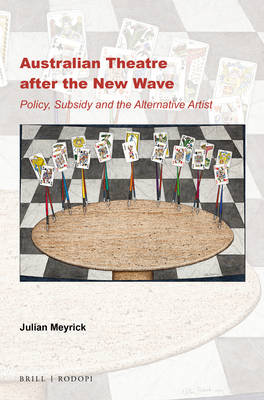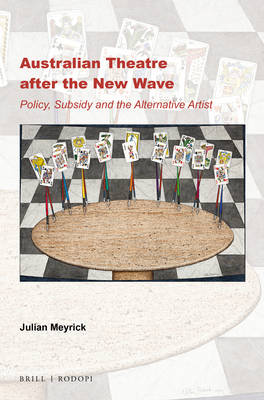
- Retrait gratuit dans votre magasin Club
- 7.000.000 titres dans notre catalogue
- Payer en toute sécurité
- Toujours un magasin près de chez vous
- Retrait gratuit dans votre magasin Club
- 7.000.0000 titres dans notre catalogue
- Payer en toute sécurité
- Toujours un magasin près de chez vous
138,95 €
+ 277 points
Description
In Australian Theatre after the New Wave, Julian Meyrick charts the history of three ground-breaking Australian theatre companies, the Paris Theatre (1978), the Hunter Valley Theatre (1976-94) and Anthill Theatre (1980-94). In the years following the controversial dismissal of Gough Whitlam's Labor government in 1975, these 'alternative' theatres struggled to survive in an increasingly adverse economic environment. Drawing on interviews and archival sources, including Australia Council files and correspondence, the book examines the funding structures in which the companies operated, and the impact of the cultural policies of the period. It analyses the changing relationship between the artist and the State, the rise of a managerial ethos of 'accountability', and the growing dominance of government in the fate of the nation's theatre. In doing so, it shows the historical roots of many of the problems facing Australian theatre today.
"This is an exceptionally timely book... In giving a history of Australian independent theatre it not only charts the amazing rise and strange disappearance of an energetic, radical and dynamically democratic artistic movement, but also tries to explain that rise and fall, and how we should relate to it now."
-- Prof. Justin O'Connor, Monash University
"This study makes a significant contribution to scholarship on Australian theatre and, more broadly... to the global discussion about the vexed relationship between artists, creativity, government funding for the arts and cultural policy."
-- Dr. Gillian Arrighi, The University of Newcastle, Australia
"This is an exceptionally timely book... In giving a history of Australian independent theatre it not only charts the amazing rise and strange disappearance of an energetic, radical and dynamically democratic artistic movement, but also tries to explain that rise and fall, and how we should relate to it now."
-- Prof. Justin O'Connor, Monash University
"This study makes a significant contribution to scholarship on Australian theatre and, more broadly... to the global discussion about the vexed relationship between artists, creativity, government funding for the arts and cultural policy."
-- Dr. Gillian Arrighi, The University of Newcastle, Australia
Spécifications
Parties prenantes
- Auteur(s) :
- Editeur:
Contenu
- Nombre de pages :
- 286
- Langue:
- Anglais
- Collection :
- Tome:
- n° 17
Caractéristiques
- EAN:
- 9789004339880
- Date de parution :
- 20-10-17
- Format:
- Livre broché
- Format numérique:
- Trade paperback (VS)
- Dimensions :
- 155 mm x 231 mm
- Poids :
- 453 g

Les avis
Nous publions uniquement les avis qui respectent les conditions requises. Consultez nos conditions pour les avis.






